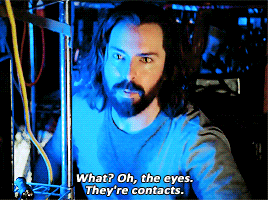Bertram Gilfoyle is Pied Piper’s resident system architect, security expert, and all‑around technological wizard. A Canadian Satanist with a dry wit and a perpetual air of superiority, Gilfoyle is one of the most distinctive voices in Silicon Valley.
He is brilliant, cynical, and almost impossible to like. Yet he is also indispensable.
Gilfoyle represents the archetype of the hyper‑competent but socially abrasive team member: the kind of person who can build the backbone of your system while simultaneously insulting you for not being as smart as he is.
On the surface, Gilfoyle is a running joke about the “too cool for everything” programmer. But beneath the humor lies a sharp portrait of how intelligence, cynicism, and social detachment shape both individuals and teams.
Before We Begin: Spoiler Alert and Why This Article Exists
This article contains spoilers for Silicon Valley.
Importantly, be aware that we are not here to diagnose Gilfoyle as if he were a real person. Instead, we are using his character to explore some real psychological concepts: why cynicism can be both a shield and a weapon, how social detachment affects group dynamics, and what happens when brilliance and arrogance collide.
Meet the Character
Gilfoyle is Pied Piper’s system architect and security guru, and you can bet your bottom dollar that he knows it.
He takes immense pride in being the smartest person in the room, and he rarely misses an opportunity to remind others of it. His relationship with fellow PiedPiper programmer Dinesh is a constant cycle of insults and one‑upmanship, but beneath the mockery lies a kind of grudging respect.
Unlike Richard, who is anxious and idealistic, Gilfoyle is calm, detached, and unflappable. He very rarely shows emotion, even in crises, and often responds to chaos with dry sarcasm. His Satanist identity is less about genuine belief and more about embracing contrarianism, a way of signaling that he rejects mainstream values and absolutely refuses to play by anyone else’s rules.
Gilfoyle doesn’t care about others’ feelings and frames his interactions as just blunt honesty. This can make him very difficult to work with (especially when we’re talking about someone like Jared who nerds out on operational frameworks and tends to be more diplomatic), but there are also plenty of times where that approach is exactly what the situation requires.

Spotlight: Cynicism as Armor
We immediately pick up on the fact that Gilfoyle’s defining trait is his cynicism. He approaches people with skepticism, ruthlessly mocks idealism, and assumes total incompetence until proven otherwise. This cynicism serves as armor. By keeping others at a distance, Gilfoyle avoids vulnerability and maintains control.
Psychologically, cynicism can function as a defense mechanism. It protects against disappointment by lowering expectations, but it also creates distance. Gilfoyle rarely forms genuine connections (his girlfriend, Tara, being the main exception here) because cynicism makes intimacy feel risky. His relationship with Dinesh is the closest he comes to friendship, and even that is expressed through constant insults.
Yet it’s important to acknowledge that cynicism also has value!
Cynical thinkers often spot flaws that others overlook. Gilfoyle’s skepticism makes him an excellent security architect because he naturally assumes systems can be broken, hacked, or exploited. As bleak as his worldview may be, it is also practical, as Gilfoyle proves time and time again.
The Psychology Behind the Detachment
Gilfoyle represents the archetype of the socially detached genius. He is highly intelligent, highly skilled, and entirely uninterested in social niceties. This combination is both an asset and a liability.
Personality psychology offers a useful lens here.
Gilfoyle embodies low agreeableness, one of the five major personality traits in the Big Five model. People low in agreeableness are competitive, blunt, and unconcerned with maintaining harmony. They often come across as arrogant or abrasive, but they are also less likely to sugarcoat reality.
In Gilfoyle’s case, this means he will tell Richard exactly when an idea is doomed, even if it crushes morale. His bluntness is certainly painful, but it also prevents the team from chasing pointless fantasies.
He also shows traits of low extraversion. Gilfoyle is not energized by social interaction; he prefers to keep to himself, working quietly and emerging only to deliver a sarcastic remark.
This detachment makes him appear aloof or standoffish, but it also allows him to stay calm in high‑stress situations. While Richard spirals into panic, Gilfoyle remains steady, almost amused by the chaos.
And of course, there’s his emotional detachment.
Gilfoyle rarely expresses vulnerability. He does not celebrate victories with enthusiasm, nor does he show despair in failure. This flat affect can frustrate teammates who crave encouragement, but it also makes him a kind of stabilizing force. In crises, Gilfoyle does not add to the panic; he simply gets to work.
From a group dynamics perspective, Gilfoyle embodies the paradox of the “difficult genius.”
Teams often tolerate abrasive personalities when the person brings unique, irreplaceable value. Gilfoyle’s brilliance in system architecture and security makes him indispensable, so his cynicism is endured. But this tolerance comes at a cost: his negativity can erode team spirit, and his dismissiveness can stifle collaboration.
As Jared realizes when trying to implement SCRUM at Pied Piper, the best way to get Gilfoyle “collaborating” and working within the system is to have him compete with Dinesh, who is always looking for any opportunity to one-up Gilfoyle, as is their relationship. While Gilfoyle and Dinesh see what Jared is doing, neither will “concede” to the other.
What makes Gilfoyle fascinating is that he clearly knows how he is and, in fact, prides himself on that. He does not aspire to be liked. He aspires to be right, and in his world, being right is more important than being liked.
That attitude makes him both a liability and a hugely powerful secret weapon.
Beyond Silicon Valley: Why It Matters
As with most characters on Silicon Valley, Gilfoyle is funny because he is exaggerated, but his psychology is something that many of us are at least somewhat familiar with. Many teams have their own “Gilfoyles”, those brilliant individuals who lack people skills, resist authority, and approach everything with a cynical eye.
These people can be frustrating, but they also bring unique strengths. They often see the risks that others ignore, push back relentlessly against groupthink, and provide technical expertise that is unmatched. The challenge lies in balancing their brilliance with their abrasiveness.
For leaders, the lesson is clear: you cannot change a Gilfoyle into a team cheerleader, but you can create an environment where their strengths are maximized and their cynicism does not poison the group. That often means giving them autonomy, respecting their expertise, and not expecting them to be someone they are not.
Of course, it would be unforgivable not to include one of my favorite scenes in the whole series here, where, after waging an all-out war of malicious compliance against Tracy, PiedPiper’s new head of HR, Gilfoyle finds himself outplayed.
Bonus Section: Do Teams Need a Gilfoyle?
The question is worth asking: Do teams actually need a Gilfoyle?
On one hand, people like Gilfoyle can be a nightmare, especially for a leader who hasn’t managed a “Gilfoyle” type person before. Their cynicism drags down morale, their arrogance alienates colleagues, and their lack of tact creates friction. In extreme cases, they can become toxic presences who undermine collaboration at seemingly every turn.
But on the other hand, people like Gilfoyle can be invaluable. Their brilliance can save projects, their skepticism can prevent disasters, and their refusal to sugarcoat reality can keep teams grounded. A Gilfoyle may never be the heart of a team, but they can certainly be its backbone.
The truth is that teams benefit from diversity of personality. Not everyone can be a Richard Hendricks, full of anxious idealism. Not everyone can be a Jared Dunn, endlessly supportive and optimistic. Sometimes, a team needs someone who will roll their eyes, poke holes in bad ideas, and quietly build the infrastructure that makes everything else possible.
So now we ask again: do teams need a Gilfoyle?
Perhaps not every team. But for teams tackling complex, high‑stakes problems, having a Gilfoyle can mean the difference between fragile optimism and robust reality. The key is learning how to manage them without letting their cynicism consume the group.
Tomato Takeaway
As the sarcastic Satanist of Silicon Valley, Bertram Gilfoyle is a fantastic example of cynical intelligence, social detachment, and the complicated role that difficult geniuses play in teams. His story reminds us that brilliance often comes with rough edges, and that the challenge of leadership is not sanding those edges down, but learning how to work with them.
Now it is your turn to join the conversation!
Do you see Gilfoyle as an asset to Pied Piper, or as a liability they simply had to tolerate?
Share your thoughts in the comments. Your perspective might help others see both Gilfoyle and their own “Gilfoyles” in a new light.
Fueled by coffee and curiosity, Jeff is a veteran blogger with an MBA and a lifelong passion for psychology. Currently finishing an MS in Industrial-Organizational Psychology (and eyeing that PhD), he’s on a mission to make science-backed psychology fun, clear, and accessible for everyone. When he’s not busting myths or brewing up new articles, you’ll probably find him at the D&D table or hunting for his next great cup of coffee.


